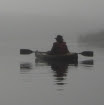Coming soon: the Great Backyard Bird Count!
I've been idly wondering about taking part in a bird count for years, but only idly. I got almost serious about it when my work assignments had me learning bird calls and identifying the birds in an area by sound (as part of pre-development site assessments). The famous "Breeding Bird Survey," or BBS, is done by sound, and I dreamed that I might be getting good enough to volunteer, but never got up the nerve to put my skills to the test.
A Christmas Bird Count would be a much easier place to start, but somehow Christmas always seemed too busy already.
Now thanks to Clare, I've just learned about the perfect beginner bird count. It takes place February 16th to 19th, and you can do your count anywhere, for as little as 15 minutes, as long as it falls within those four days. All you do is count the maximum number of birds of each species that you see while you watch in one location. You report your counts online, and there are instructions and tips to get you started. If you really get into it, you don't have to stop on the 19th after all; you can report observations to eBird all year long. (Click here for eBird Canada.)
Don't know many birds? Well, in February in Saskatchewan, you don't need to know many! I got browsing through the eBird data and came up with a listing of 27 bird species that have been reported for Saskatchewan, in the Prairie Pothole Region, within the month of February. (Choose "All birds at a location," and then "Within Bird Conservation Regions that I choose in this state or province," then make your selections. Once you get a list, click on a month title to limit the list to species seen in that month.) Many of those species you might already know, and the rest you can check in a bird guide. (There are many well-known guides to North American birds, but Saskatchewan Birds is an excellent guide that won't drown you in information about birds never seen north of Texas.) For those of you in warmer climes, all I can say is "good luck"!
If you'd rather click than walk to a bookshelf or a bookstore, try the Cornell Online Bird Guide.
Uh-oh. I feel an idea coming on. Maybe I could volunteer to do a presentation at the school, to let kids know about this Great Backyard Bird Count and get them ready to take part. Most of the older kids will be off on a ski trip on the 16th, and school is closed for the week of the 19th, so a school outing to do the actual counts is probably out. But if they could go home and get their parents interested, so much the better.
how can we all be free?
2 days ago





